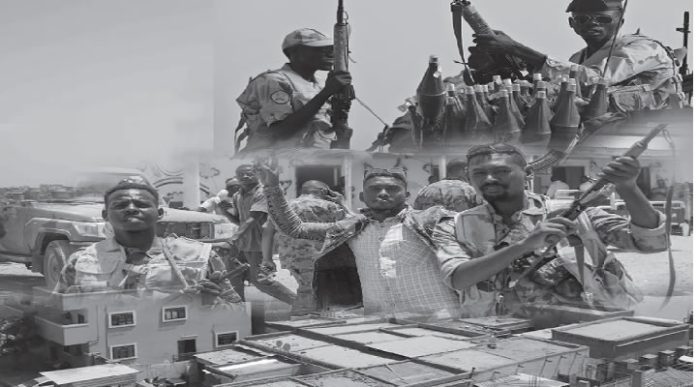The fighting pits the forces of army chief Abdel Fattah al-Burhan against his ex-deputy Mohamed Hamdan Daglo, who commands the Rapid Support Forces, a heavily armed paramilitary group.
More than 500 people have been killed and tens of thousands of people have fled since battles erupted on April 15.
“The scale and speed of what is unfolding is unprecedented in Sudan. We are extremely concerned by the immediate as well as long-term impact on all people in Sudan, and the broader region,” Stephane Dujarric, the spokesperson for Guterres, said in a statement.
He said the UN chief was “immediately” sending Martin Griffiths, his emergency relief coordinator, to the area “in light of the rapidly deteriorating humanitarian crisis in Sudan”.
The latest widely breached ceasefire was scheduled to formally expire at midnight (2200 GMT), before the rival forces announced an extension of 72 hours, which the Sudanese army said came due to “US and Saudi mediation”.
Witnesses on Sunday evening reported continued clashes as well as fighter jets soaring above various parts of the capital and its twin city Omdurman, across the Nile River.
The civil aviation authority announced Sudan’s airspace would remain closed until May 13, with the exception of aid and evacuation flights.
“There has been very heavy fighting and loud gunfire,” a southern Khartoum resident told AFP earlier in the day.
Further complicating the battlefield, Central Reserve Police, a paramilitary unit, were being deployed across Khartoum to “protect citizens’ properties” from looting, the Sudanese police said, confirming an army statement.
Police said Central Reserve had arrested 316 “rebels”, a reference to the RSF, which did not confirm the information and had previously warned police against joining the fight.
Washington last year sanctioned the Central Reserve for “serious human rights abuses” related to its use of “excessive force” against pro-democracy protests after the October 2021 coup that brought Burhan and Daglo to power.
Daglo’s RSF is descended from the Janjaweed unleashed by former dictator Omar al-Bashir in Sudan’s western Darfur region, leading to war-crimes charges against Bashir and others.
– ‘God forbid’ –
With projectiles crashing into residential buildings, supplies running short and daily life increasingly untenable for civilians, foreign nations have scrambled to evacuate their nationals by air, road and sea.
But millions of Sudanese are still trapped in the country, where aid workers are among the dead and the UN said humanitarian facilities have been looted, forcing a halt to all of its aid operations.
“We once again urge all parties to the conflict to protect civilians and civilian infrastructure, allow safe passage for civilians fleeing areas of hostilities, respect humanitarian workers and assets, facilitate relief operations, and respect medical personnel, transport and facilities,” Dujarric said.
A first Red Cross plane brought eight tonnes of humanitarian aid from Jordan to Port Sudan, which is so far untouched by the fighting. The aid included surgical material and medical kits to stabilise 1,500 patients.
On Saturday the health ministry said the violence has wounded around 4,600 people and killed at least 528.
Those figures are likely to be incomplete.
The UN World Food Programme has warned the unrest could plunge millions more into hunger in a country where 15 million people already needed aid to stave off famine.
Only 16 percent of health facilities are functioning in Khartoum, according to the World Health Organization, with many shelled.
“The situation cannot be sustained” as medical supplies run short, warned Majzoub Saad Ibrahim, a doctor in Ad Damar, north of Khartoum.
An envoy of Burhan’s met on Sunday in Riyadh with Saudi Foreign Minister Prince Faisal bin Farhan, who urged the restoration of calm in Sudan, his ministry said.
Egypt has called an Arab League meeting of its permanent delegates Monday to discuss the situation.
– ‘Dangerous conditions’ –
More than 75,000 people have been internally displaced in Sudan, the UN said, and almost 40,000 have crossed borders, mostly into Chad but also South Sudan and Ethiopia, aid workers said.
Around 6,000 people, most of them women, have fled to neighbouring Central African Republic over the last two weeks, the UN refugee agency told AFP.
More than 5,000 people have escaped to safety on Saudi Arabian ships across the Red Sea from Port Sudan, the kingdom said.
Among them was Badriah al-Sayed, her Omani husband and their son, who joined about 50 other evacuees who reached Jeddah on a Saudi warship Sunday.
Sayed told AFP she was grateful for their safety but could not shake the feeling she was “losing a country”.
Britain said it would operate an additional evacuation flight, from Port Sudan on Monday, after already airlifting more than 2,000 people out of the country from an airport near Khartoum.
Along with battles in the capital, fighting, looting and lawlessness in the long-troubled Darfur region has raised particular international concern.
At least 96 people were reported killed in El Geneina, West Darfur, the UN said.
AFP
Share your story or advertise with us: Whatsapp: +2347068606071 Email: info@newspotng.com














